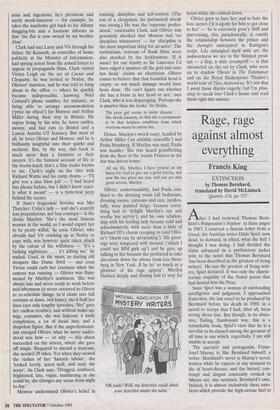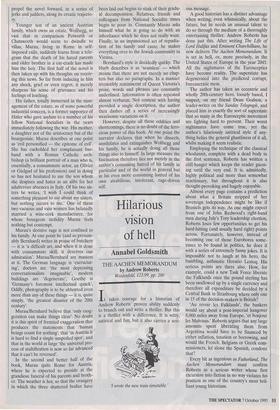Rage, rage against almost everything
Francis King
EXTINCTION by Thomas Bernhard, translated by David McLintock Quartet, £16, pp. 335 After I had reviewed Thomas Bern- hard's Wittgenstein's Nephew in these pages in 1987, I received a furious letter from a friend, the Austrian writer HiIde Spiel, now dead, to demand, in effect, what the hell I thought I was doing. I had derided the claim advanced in a perfunctory jacket note to the novel that Thomas Bernhard 'has been described as the greatest of living writers'. He was the greatest of living writ- ers, Spiel declared. It was only the charac- teristic stupidity of the Nobel jurors that had denied him the Prize.
Since Spiel was a woman of outstanding intelligence and judgment, I approached Extinction, the last novel to be produced by Bernhard before his death in 1989, in a mood to accept that I had, after all, been wrong about him. But though, in its obses- sive, flailing, flamboyant way, this is a remarkable book, Spiel's view that he is a novelist to be classed among the greatest of all time is one which, regretfully, I am still unable to accept.
The narrator and protagonist, Franz- Josef Murau, is, like Bernhard himself, a writer. Bernhard's novel is Murau's novel, written while he expects at any moment to die of heart-disease, and the hatred, con- tempt and disgust constantly evoked in Murau are, one surmises, Bernhard's own. Indeed, it is almost exclusively these emo- tions which provide the high-octane fuel to propel the novel forward, in a series of jerks and judders, along its erratic trajecto- ry.
Younger son of an ancient Austrian family, which owns an estate, Wolfsegg, so vast that in comparison Petworth or Chatsworth would seem to dwindle to villas, Murau, living in Rome in self- imposed exile, suddenly learns from a tele- gram that the death of his hated parents and older brother in a car-crash has made him the heir. The first half of the novel is then taken up with his thoughts on receiv- ing this news. So far from inducing in him any shock, grief or even regret, it merely sharpens his sense of grievance and his feelings of loathing.
His father, totally immersed in the man- agement of the estate, as of some powerful industrial concern, is a former supporter of Hitler who gave asylum to a number of his fellow National Socialists in the years immediately following the war. His mother, a daughter not of the aristocracy but of the bourgeoisie, Murau describes at one point as 'evil personified — the epitome of evil'. She has cuckolded her complaisant hus- band with a Roman Catholic arch- bishop (a brilliant portrait of a man who is, essentially, a consummate actor, an Olivier or Gielgud of his profession) and in doing so has not hesitated to use the son whom she despises and hates as an alibi for her adulterous absences in Italy. Of his two sis- ters he writes, 'I wish I could think of something pleasant to say about my sisters, but nothing occurs to me.' One of these two vacuous and vain women has belatedly married a wine-cork manufacturer, for whose bourgeois stolidity Murau feels nothing but contempt.
Murau's derisive rage is not confined to his family. At one point he (and so presum- ably Bernhard) writes in praise of butchery — it is 'a difficult art, and when it is done with consummate skill, it deserves our admiration'. Murau/Bernhard are masters at it. The German language is 'excruciat- ing', doctors are 'the most depressing conversationalists imaginable', modern buildings are 'degenerate', Goethe is 'Germany's foremost intellectual quack'. Oddly, photography is to be abhorred even more than any of these things — it is, quite simply, 'the greatest disaster of the 20th century'.
Murau/Bernhard believe that 'only exag- geration can make things clear'. No doubt it is this spirit of frenzied exaggeration that produces the statements that 'human beings count for nothing', that 'in Austria it is hard to find a single unspoiled spot', and that in the world at large 'the universal pro- cess of stultification is now so far advanced that it can't be reversed'.
In the second and better half of the book, Murau quits Rome for Austria, where he is expected to preside at the grandiose funeral of his parents and broth- er. The weather is hot, so that the orangery in which the three shattered bodies have been laid out begins to stink of their gradu- al decomposition. Relatives, friends and colleagues from National Socialist times begin to pour in. Constantly Murau asks himself what he is going to do with an inheritance which he does not really want. Finally, in an impassioned act of repudia- tion of his family and caste, he makes everything over to the Jewish community in Vienna.
Bernhard's style is decidedly quirky. The blurb describes it as 'seamless' — which means that there are not merely no chap- ters but also no paragraphs. In a manner irresistibly reminiscent of Queen Victoria's prose, words and phrases are constantly underlined. Information is often repeated almost verbatim. Not content with having provided a single description, the author then dashes off a series of increasingly wearisome variations on it.
However, despite all these oddities and shortcomings, there is no doubt of the fero- cious power of this book. At one point the narrator declares that when he dissects, annihilates and extinguishes Wolfsegg and his family, he is actually doing all those things also to himself. In large measure the fascination therefore lies not merely in the author's consuming hatred of his family in particular and of the world in general but in his even more consuming hatred of his own atrabilious, intolerant, rage-driven self.











































































 Previous page
Previous page